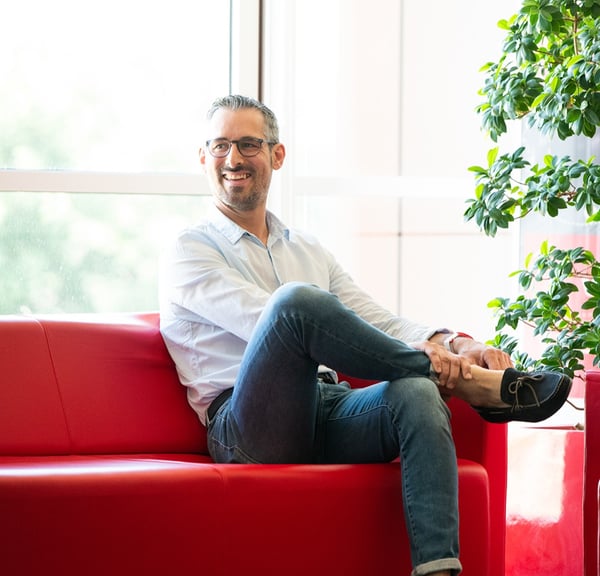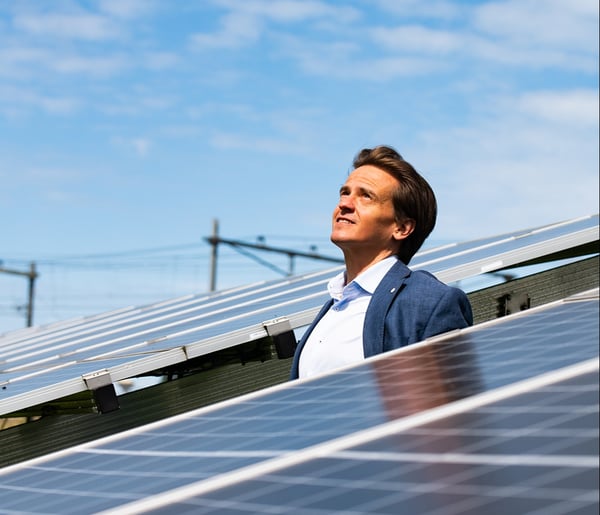- What we do
- Work with us
- Pallet overview
- About LPR
- Sustainability report 2022
- Foreword CEO Gerjo Scheringa
- Strategy business reporting
- Strategy delivering sustainability at scale
- Goals and results
- Brand ambassadors
- Sustainable change agents
- Employee health, training & development
- Green transport
- Lowering temperature washing
- Energy efficiency
- Nestlé sector collaboration
- Automation by Tanzer Solutions
- Aldi UK sustainability solutions
- Stakeholder management
- About Euro Pool Group
- Sustainability report 2021
- Sustainability
- About Us
- Research and development
- Safety and security
- Sustainability report 2022
- More
- MyLPR
- Contact
FRET21: Integrating the climate impact of transport in LPRs sustainability approach
Interview with Christophe Garrigues, Optimisation and Planification Manager at LPR and Audrey Miquel, Sustainable Supply Chain Coordinator at LPR
To further drive the reduction of carbon footprint in logistics, LPR France joined FRET21. The French initiative provides tools to calculate the carbon footprint emissions and to develop concrete action plans to reduce emissions. FRET21 is the equivalent of Lean&Green in other European countries. The activities that LPR France undertakes under the initiative set an example for other LPR countries.
FRET21 is an initiative of the French Agency for the Environment and Energy Management (ADEME) and encourages companies that work with transport partners to reduce the climate impact of freight transport. FRET21 focuses on the following four themes: loading rate, distance optimisation, means of transport and responsible purchasing. Through the initiative, LPR France has committed to reducing its CO2 emissions directly related to transport by at least 5.5% from 2021 until 2023.
Together with our retailers, we are working on optimising the loading rate of our trucks, by focusing on platform collection and reverse logistics. We started with two retailers, and we have so far been able to increase the loading rate by 2%.
In addition, we have been developing optimisation plans for transport flows, with a view to reducing our overall transport distances. To achieve this, we will open service centres in strategic locations, optimise our routing and drive fully loaded trucks as much as possible. This will help us to further reduce distances travelled.
A key element of LPR’s reduction plan is the transition to multimodal transport and green carriers. We also aim to replace 9,000 conventional trucks by trucks that run on green energy such as biogas or biofuel. We want to increase the share of greener carriers to 94%. These carriers should be certified and ideally working as part of a programme such as FRET21. This requires an investment from transport partners in upgrading their fleet. Carriers decide themselves what technology and fuel type they wish to invest in. It requires patience and persuasion for our carriers to switch to a greener fleet.
Consequently, we consider our carriers not simply as suppliers but more as partners with whom we build long-term relationships. We are currently working closely with 10 carriers, who represent about 80% of our business.
Our greatest achievement in 2021 was the conversion from truck to rail. We studied carefully how to convert road transport to rail transport, and in the end, we were able to implement this conversion. The train is a very reliable means of transportation, and we are now considering a new line for 2022. Our goal is to avoid 700 trucks on the road by converting to rail transport, and recently we have already reached half of this target. In 2022, we will also test the use of a line of riverboats on the river Seine. Furthermore, we are working with one of our clients on the implementation of trucks that run on compressed gas.
Joining FRET 21 shows that we are serious about reducing emissions in our supply chain, and it also adds to the visibility of our commitment. It allows us to be part of a larger discussion and to take part in the transition towards a more sustainable future.


"The results that we achieved under FRET21 set an example of how we can significantly reduce emissions in our supply chain.”
Audrey Miquel, Sustainable Supply Chain Coordinator at LPR

Towards a circular water model at EPS depots
Interview with Francisco Lopez, International Depot Operations and Procurement Manager at EPS
At EPS we have been through a huge transition in recent decades. Our main business activities have remained the same, namely providing reusable standard packaging, but the way we do this has changed significantly. Over the years we have become much more efficient, data driven and environmentally friendly in our operations.
In our depots, this move is partly driven by automation and by the increased use of high technology in the washing and drying process of our trays. The transition from conventional blowers to energy-efficient centrifuges is ongoing. This saves 25% of energy in the total washing process. Besides reducing energy consumption, the majority of our depots are now running on 100% green energy. Moreover, we continue to explore and implement other energy-saving equipment to further reduce our energy consumption.
As we are well on our way to reducing the energy consumption at our depots, we are now also looking into our water consumption. To reduce our water consumption, we are exploring whether we can partially re-use the wastewater of our washing process. In our depots, wastewater is captured in tanks that are regularly emptied.
In 2021, together with Leiden University we investigated different options to treat our wastewater, to improve its parameterisation and to re-use the water as process water. Our goal is to purify the water to clean water quality so that we can re-use it in our washing process. Thus, we are moving towards a circular model for water use, and this can drastically reduce our water consumption. Implementing this across EPS is challenging, as the legislation about wastewater and potable water quality varies across countries.
As a chemical engineer, I find it fascinating to work together with our knowledge partners to find the optimal solution to close the loop, tailor-made to fit various contexts but at the same time as modular as possible.
We plan to launch a pilot in 2022, starting with testing equipment such as dissolving air flotation (DAF). The re-use of wastewater can have an enormous impact on our water consumption.
